Physical Address
304 North Cardinal St.
Dorchester Center, MA 02124
Physical Address
304 North Cardinal St.
Dorchester Center, MA 02124
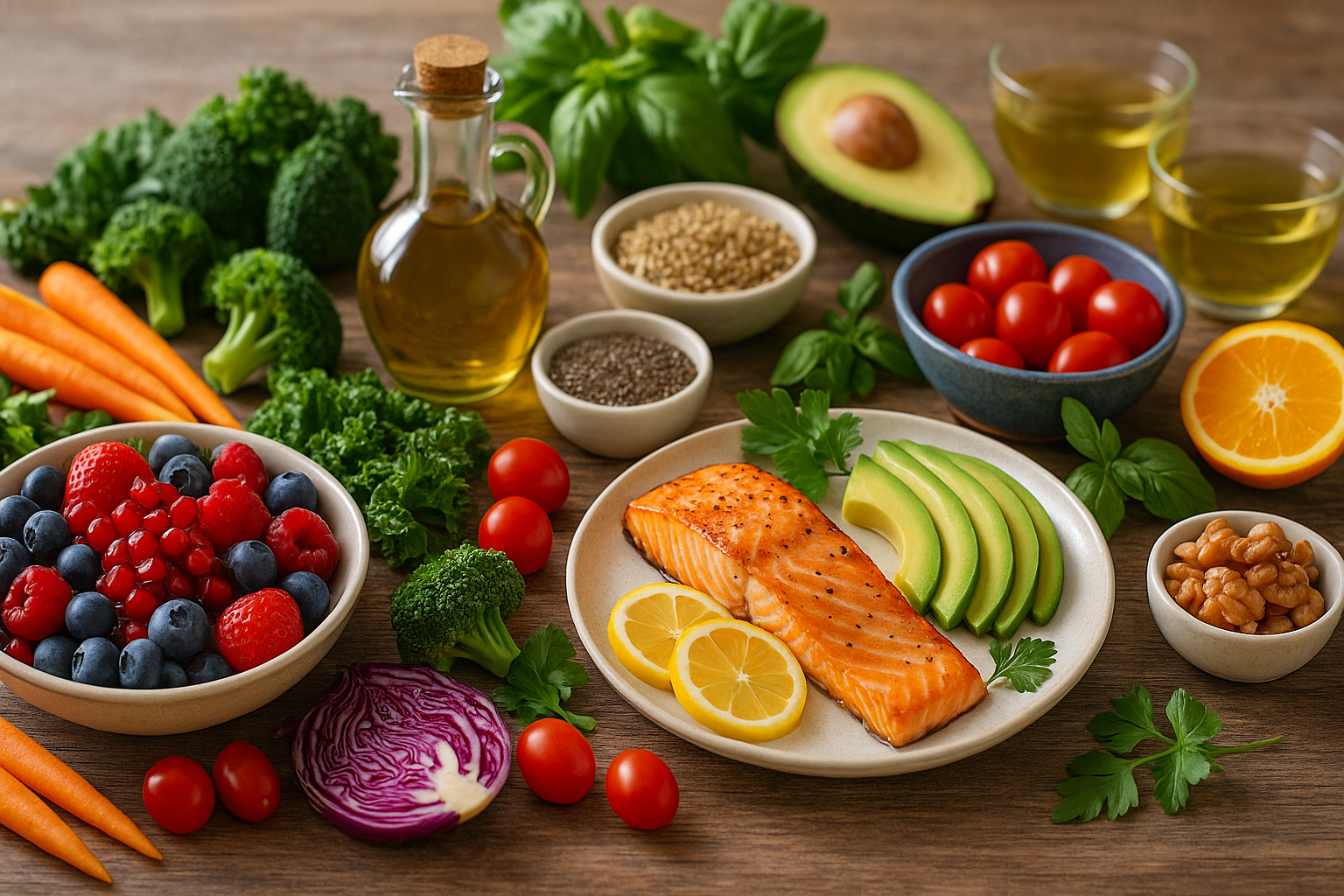

Discover how your daily food choices can help you look younger, feel more vibrant, and slow the hands of time. This evidence-based guide reveals the best anti-aging food habits for glowing skin, boundless energy, and lifelong wellness.
There’s no magic potion to stop aging, but what you eat can have a profound impact on how gracefully you age. Our skin, brain, and organs all depend on the nutrients we supply them. Consistently choosing foods that nourish and protect your cells means more years of vitality and less risk of chronic illness. Let’s journey through the food habits proven to help you stay youthful inside and out.
Read “10 Simple Tips to Stay Hydrated and Healthy All Year Long“
Every second, your cells are exposed to stress—both from the environment and natural metabolism. Over time, DNA damage and a decline in cell repair mechanisms lead to what we see as aging: fine lines, dull skin, and slowing energy. The process might sound inevitable, but the right nutrition gives your body the raw materials to build, protect, and rejuvenate itself.
Oxidative stress is like rust on a car—when free radicals (unstable molecules) run rampant, they damage cells, accelerating aging and disease. Antioxidants, found in vibrant fruits, veggies, and some fats, act as rust-proofing for your cells. By eating a colorful, antioxidant-rich diet, you put the brakes on aging at the microscopic level (reference).
Research shows that diets loaded with antioxidants, healthy fats, lean proteins, and complex carbs not only slow the aging process but also support mental clarity and emotional well-being. Choosing the right foods is one of the most powerful acts of self-care for longevity.
Antioxidants like vitamins C and E, beta-carotene, and selenium shield your skin and internal organs from damage. Eating these daily helps keep your complexion bright and your cells functioning optimally. Think of them as your natural defense force, constantly at work to keep you looking and feeling young.
Inflammation, especially when it’s chronic and low-grade, accelerates tissue damage. Foods such as fatty fish, turmeric, leafy greens, and berries reduce inflammatory signals in the body, easing joint pain and protecting the skin from premature aging.
Balanced meals help maintain muscle tone, stable blood sugar, and mental focus. Lean proteins support tissue repair, healthy fats keep your skin supple, and whole carbs provide energy without the crash. Visualize your plate as a colorful canvas: protein, fat, and lots of vibrant plants.
Each color in fruits and vegetables signals a different phytonutrient. For example, the deep red in tomatoes comes from lycopene, which helps defend your skin from UV damage. Dark green spinach is loaded with lutein, supporting eye health. Regularly mixing red, orange, yellow, green, blue, and purple produce into your meals ensures your cells get a spectrum of age-fighting nutrients.
Practical Tip: Create a “rainbow veggie bowl” by roasting sweet potatoes, steaming broccoli, adding shredded purple cabbage, fresh cherry tomatoes, and a handful of chickpeas over fluffy quinoa. Drizzle with olive oil and a squeeze of lemon for an easy, anti-aging lunch that looks as good as it tastes.
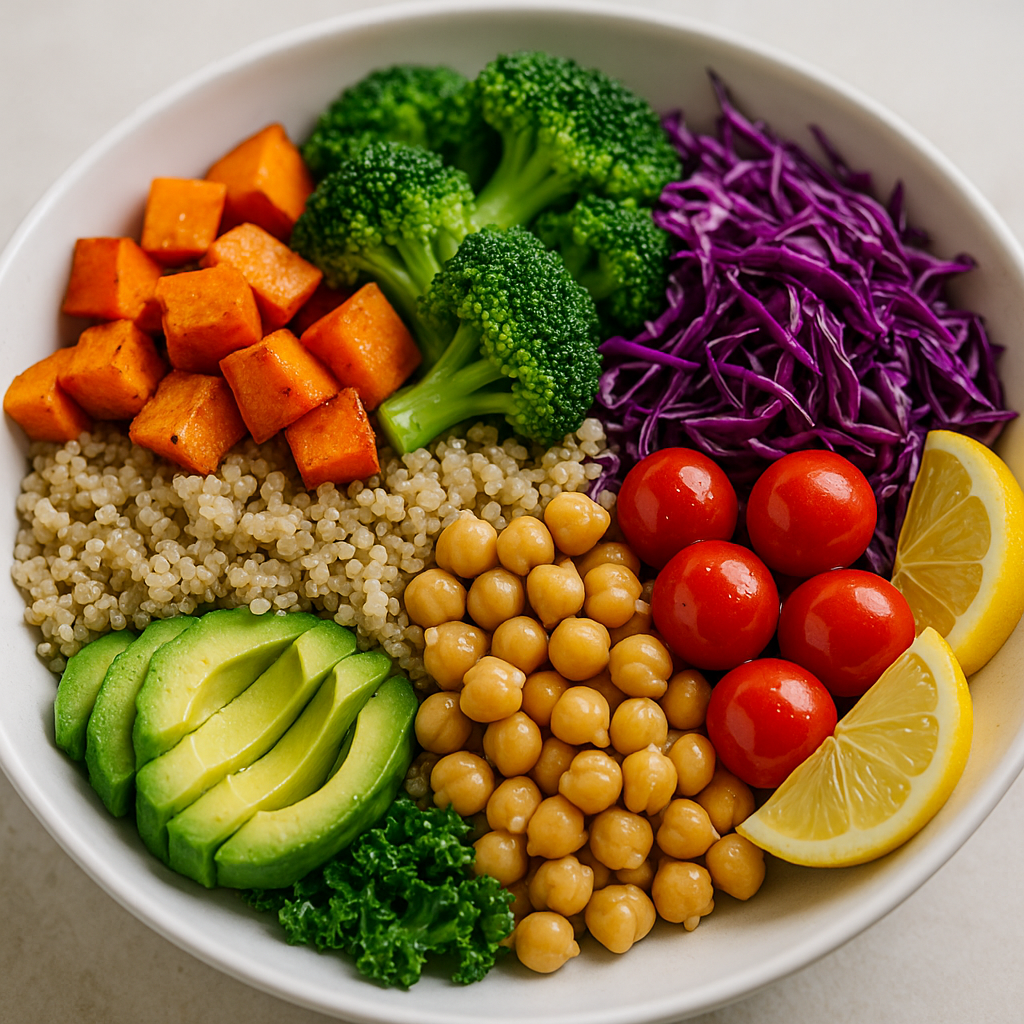
Broccoli, cauliflower, kale, and Brussels sprouts contain sulfur compounds that help your liver neutralize and remove toxins. A strong liver is essential for glowing skin and efficient metabolism. Toss these veggies into stir-fries or salads, or simply steam and top with a dash of olive oil and a sprinkle of seeds for extra crunch and nutrition.
Fat is not your enemy—especially when it comes from sources rich in omega-3s. Wild salmon, sardines, flaxseeds, and walnuts offer fats that keep your brain sharp, ease inflammation, and support your heart. Studies link regular omega-3 intake to reduced risk of cognitive decline and longer healthspan (reference).
Practical Meal: A Mediterranean salmon salad brings together these healthy fats with leafy greens, ripe avocado, tomatoes, and a lemony olive oil dressing. Not only does this combination taste luxurious, but it also delivers anti-inflammatory power and supports supple skin.
Olive oil is prized in Blue Zones—areas where people routinely live past 100. It’s not just a salad topper; it’s loaded with monounsaturated fat and polyphenols, compounds that keep your blood vessels flexible and your skin radiant. Swapping butter or margarine for olive oil in your cooking is an effortless anti-aging upgrade.
Your muscles, skin, and even your immune system are made from protein. As we age, our bodies naturally lose muscle mass, so it’s crucial to eat enough high-quality protein daily. Wild-caught fish and organic eggs are excellent choices. For those on a plant-based diet, lentils, beans, and tofu are packed with muscle-preserving protein and additional fiber.
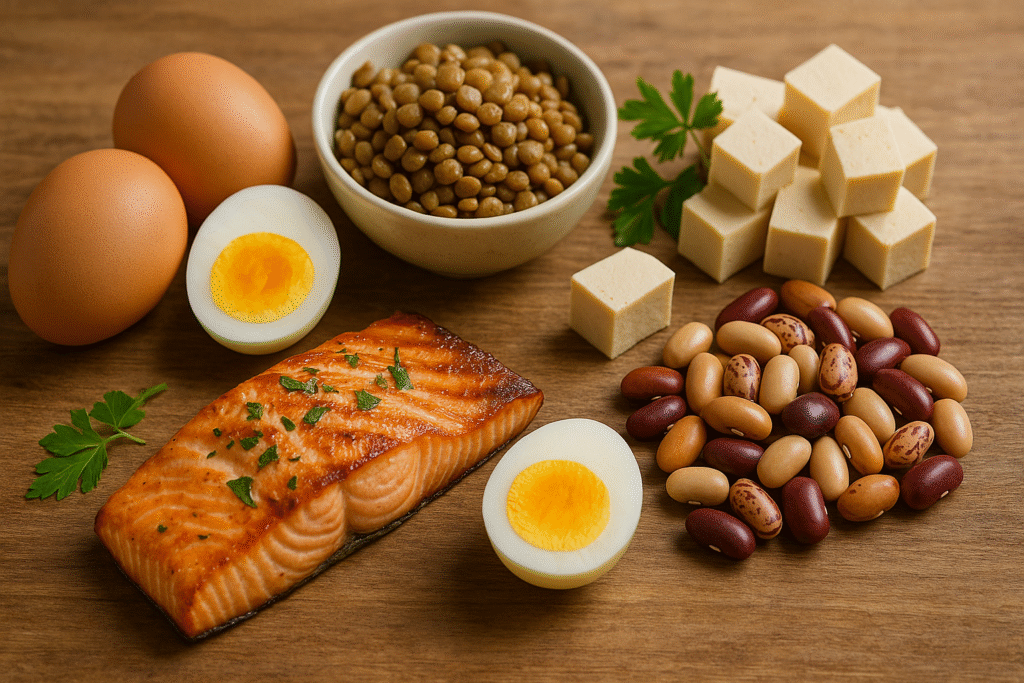
Collagen gives your skin its bounce and firmness, but it declines with age. Supporting your body’s collagen production with foods rich in vitamin C (like bell peppers and citrus), bone broth, and leafy greens helps maintain youthful skin texture. Sipping a cup of homemade bone broth or enjoying a citrus-kale salad can be delicious ways to nurture your skin from within.
A healthy gut is key to absorbing nutrients and fighting inflammation. Fermented foods such as yogurt, kefir, kimchi, and sauerkraut are teeming with probiotics—beneficial bacteria that keep your gut ecosystem balanced. When your digestion is on point, your whole body feels the difference: more energy, better mood, and radiant skin.
Probiotics need food, too! Prebiotic fibers from foods like onions, garlic, and asparagus feed the good bacteria, ensuring their populations thrive. You’ll notice the benefits in your digestion, immune strength, and even mental clarity.
Everyday Breakfast Idea: Prepare overnight oats with kefir for a creamy, probiotic-rich base. Add berries, chia seeds, and walnuts for fiber, healthy fat, and antioxidants, and let your gut—and your taste buds—rejoice.
Berries are tiny but mighty, packed with anthocyanins and vitamin C—compounds shown to fight free radicals and reduce visible signs of aging. Regular consumption is linked with improved brain health and smoother, more elastic skin (reference).
Berry Blast Smoothie: Blend blueberries, strawberries, half a banana, and a dollop of Greek yogurt. The result? A powerhouse breakfast or snack that tastes indulgent but fights wrinkles and boosts your immune system.
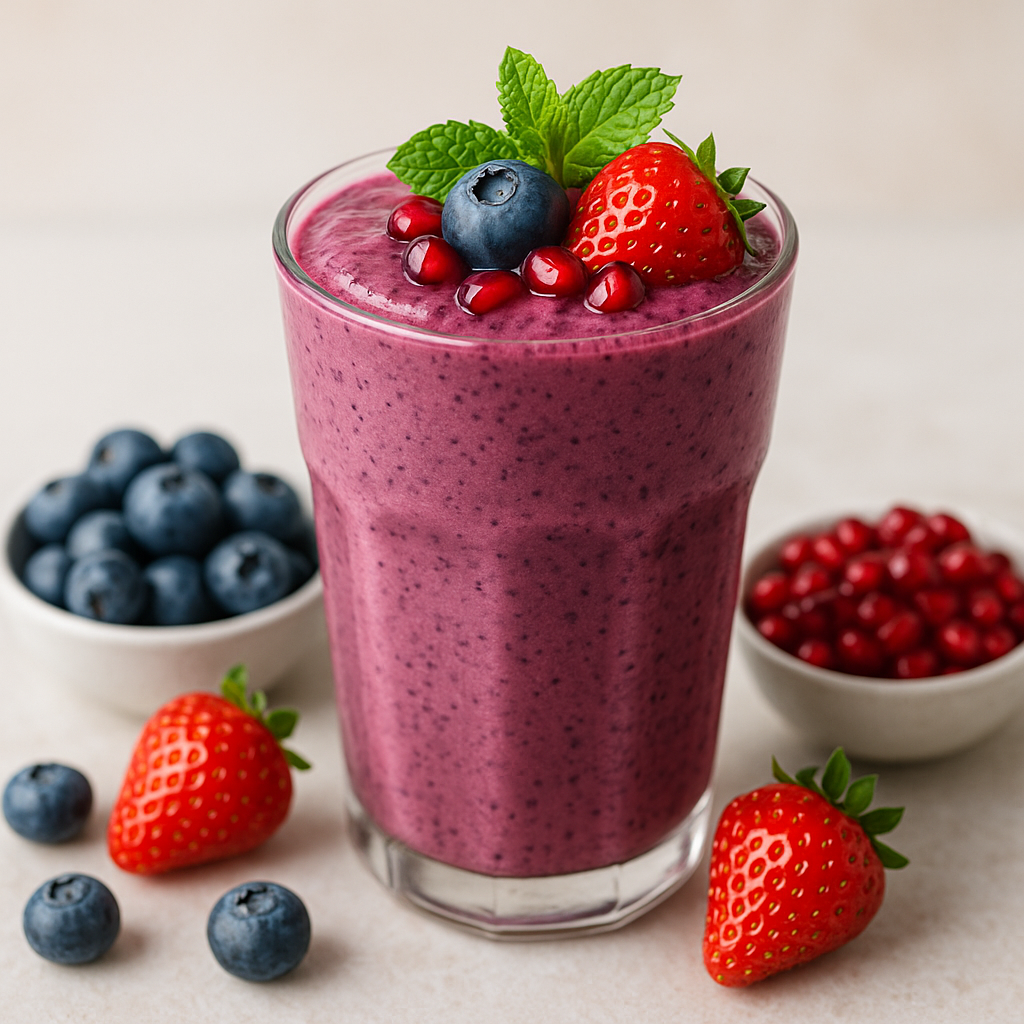
Citrus fruits like oranges and grapefruits are more than just immune boosters. Their high vitamin C content is crucial for collagen synthesis—your skin’s support structure. Enjoy citrus segments as a snack or toss them into salads for a fresh burst of flavor and skin support.
Refined grains like white bread and pastries spike your blood sugar, fueling inflammation and hastening skin aging. Switching to whole grains—think brown rice, oats, and buckwheat—delivers steady energy, keeps you feeling full, and helps maintain stable insulin levels. Lower inflammation means fewer wrinkles and healthier organs.
Ancient grains such as quinoa, farro, and millet are rich in protein, fiber, and trace minerals. Incorporating these grains into salads, soups, or as sides can improve digestion, sustain your energy throughout the day, and contribute to a diverse, nutrient-rich diet.
Plain water is essential, but herbal teas—like green tea, chamomile, or dandelion—bring extra antioxidants and gentle detox benefits. Green tea, in particular, is linked to longer telomeres (a marker of cell aging) and improved skin elasticity. Replace one daily coffee with a cup of herbal tea and enjoy both the flavor and anti-aging perks.
Fruits and veggies such as cucumbers, watermelon, and celery are naturally high in water and provide vitamins that keep your skin plump and hydrated. Adding them to your daily snacks or tossing them into salads gives you a hydration boost from the inside out.
Certain spices work at a molecular level to lower inflammation and protect cells from damage. Turmeric’s active compound, curcumin, has potent anti-aging effects. Ginger and cinnamon help regulate blood sugar and enhance circulation, giving your skin a healthy glow. Add these spices to teas, oatmeal, or smoothies for a flavorful, age-defying twist.
Herbs such as parsley, cilantro, and basil are rich in chlorophyll and antioxidants that support the body’s natural detoxification pathways. Sprinkle them over dishes just before serving for both visual appeal and anti-aging benefits.
Nuts and seeds offer healthy fats, protein, vitamin E, and trace minerals—all essential for skin repair and brain health. A small daily portion of mixed nuts can help maintain soft skin, support cognitive function, and lower inflammation.
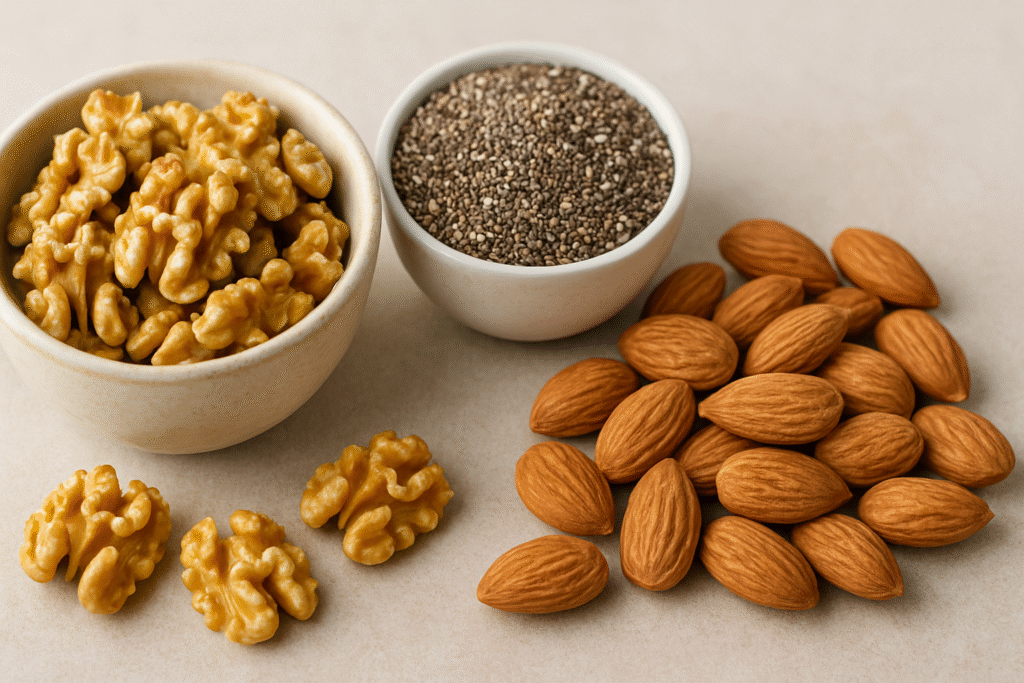
Brazil nuts and pumpkin seeds are standout sources of selenium and zinc—two minerals vital for protecting skin from sun damage and supporting immune defenses. Just a few nuts or seeds daily can cover your requirements and help your body repair and rebuild efficiently.
Sugar does more than affect your waistline. When consumed in excess, it binds to proteins like collagen, causing them to become stiff and malformed—a process called glycation. The visible result? Sagging skin and wrinkles that appear sooner.
Choosing naturally sweet foods, like fruit or unsweetened dried dates, instead of processed sweets helps prevent glycation and satisfies your sweet tooth in a nourishing way. Over time, your skin and your energy levels will thank you.
Mindful eating—savoring each bite and chewing thoroughly—gives your digestive enzymes time to work, allowing your body to absorb more nutrients. It also helps you tune in to hunger and fullness cues, supporting healthy weight management and digestion.
Giving your body regular breaks from eating, such as through intermittent fasting, has been shown to activate autophagy. This is your body’s built-in “recycling” process, cleaning out damaged cells and promoting tissue repair (reference). Even a simple 12-hour overnight fast can give your body time to refresh and renew.
Processed foods often contain artificial preservatives, flavors, and colors that fuel chronic inflammation and oxidative stress—two major drivers of aging. Every time you choose a whole food over a packaged snack, you give your body a break from these harmful additives.
When shopping, check ingredient lists for words you recognize. The fewer the ingredients, the better. Simple swaps—like roasted chickpeas instead of chips or plain Greek yogurt with fruit instead of sugary parfaits—make a big difference over time.
Proper hydration helps flush toxins, keeps skin elastic, and supports every cell in your body. The old rule of thumb—eight cups a day—is a great starting point, but your needs might vary with activity, climate, or age.
Beyond water, electrolytes like sodium, potassium, and magnesium help maintain fluid balance in and around your cells. Coconut water and mineral broths can replenish electrolytes after a workout or during hot weather, helping your body retain moisture and function optimally.
Alcohol dehydrates the skin and can disrupt restorative sleep. While an occasional glass of red wine contains antioxidants, frequent or heavy drinking accelerates the aging process, both inside and out. For those who enjoy an occasional drink, moderation and good hydration are essential.
Coffee is rich in antioxidants and may offer anti-aging benefits, but it can also disrupt sleep if consumed late in the day. Enjoy your morning cup black or with minimal sugar and milk, and consider switching to herbal tea in the afternoon for continued hydration.
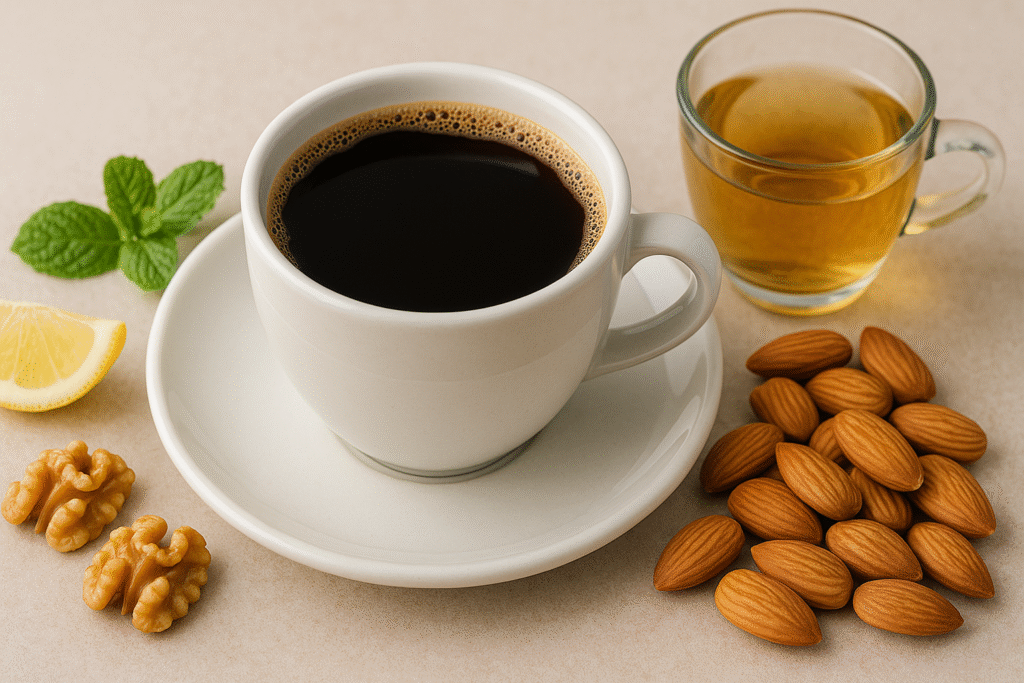
Some people age faster due to hidden food sensitivities that trigger chronic inflammation—often showing up as joint pain, brain fog, or dull skin. Pay attention to how your body feels after eating different foods, and consider an elimination diet or testing if you suspect a problem.
Annual blood tests can reveal deficiencies in vitamins, minerals, and other nutrients. Addressing these gaps with food first—and supplements as needed—can optimize your anti-aging regimen and overall health.
Consistent habits create lasting change. Planning meals and snacks ahead of time helps you avoid nutrient gaps and reduces the temptation of processed foods. Batch-cooking grains, prepping veggies, and keeping healthy snacks on hand makes anti-aging eating effortless.
Nobody eats perfectly all the time. What matters most is consistency over months and years. Celebrate the improvements you make and enjoy your favorite indulgences on occasion without guilt.
Anti-aging food habits aren’t about restriction—they’re about abundance. Colorful vegetables, vibrant fruits, healthy fats, lean proteins, and plenty of water build a strong foundation for youthfulness at any age. The journey to a more radiant you begins with each bite.
Key Takeaways:
How do you keep your plate youthful? Share your favorite anti-aging recipes or tips below!
Read more blogs from Goal for Wellness
[…] Read also “Top Anti-Aging Food Habits: Unlock Longevity Through Nutrition“. […]